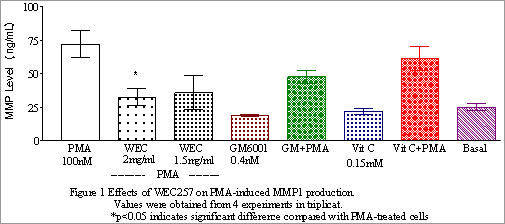Inhibitory effect of Chlorella-derived aqueous fraction (WEC257) on matrix metalloproteinases (MMPs) expression in a normal fibroblast cell line
Solar UV radiation damages human skin, affecting skin tone and resiliency and leading to premature ageing (photoaging). Oxidative stress caused by UV radiation, is known to increase PKC activity, thus increasing matrix metalloproteinases (MMPs) expression and collagen degradation ( Ricciarelli et al. 1999). Administration of Chlorella has been shown to play some biochemical functions, such as ameliorating blood glucose (Cherng & Shih 2005b) and lipid level (Cherng & Shih 2005a). Many cosmetic products also claim to contain the components of extract of Chlorella . The aim of this study was to investigate effects of Chlorella aqueous extract on PMA-induced MMP production. MMP1 production was induced by 100nM PMA (a PKC activator) in human skin fibroblast cell line (966SK). WEC257 was obtained from water extract of 10% (w/v) Chlorella by boiling for 20 min then collecting and freeze-drying the resulting supernatant from a 10 min of 10000rpm centrifugation. WEC257 (1.5 or 2 mg/ml) or MMP inhibitor GM6001 (0.4nM) was added together with PMA and incubated for 5 hours prior to MMP1 assay (R&D assay system). MMP1 protein (Western blotting) and mRNA expression (RT-PCR) were also studied. PMA-induced MMP1 production was significantly prevented by 2mg/ml of WEC257 (p<0.05) but not GM6001 (figure 1). The same dose of WEC257 also prevented protein and mRNA expressions of PMA-induced MMP1. This study shows that application of WEC257 prevents MMP1 production in 966SK cells possibly through a PKC activation pathway.
Cherng JY & Shih (2005a) Life Sciences 76:3001-3013. |


